KosherFest celebrates Jewish food, sustainability
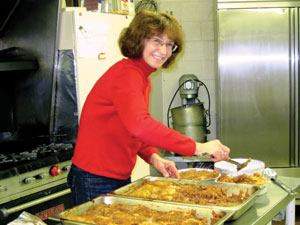 Jewish food lovers get ready. Ohev Sholom’s KosherFest, Kansas City’s Celebration of Jewish Food & Culture is just around the corner, slated for Sunday, June 3, from 11 a.m. to 5 p.m. at the congregation in the lower parking lot, located at 75th and Nall in Prairie Village.
Jewish food lovers get ready. Ohev Sholom’s KosherFest, Kansas City’s Celebration of Jewish Food & Culture is just around the corner, slated for Sunday, June 3, from 11 a.m. to 5 p.m. at the congregation in the lower parking lot, located at 75th and Nall in Prairie Village.
This will be the fourth time the event, which will feature food, music, activities for children, dancing, as well as an opportunity to browse arts, crafts and gifts, will be held. It premiered in 2007 and again in 2008 and 2010. It is being chaired by Ace Allen, Donna Oberstein, Kelly Jackson and Ruth Roth. Allen also serves as the Conservative congregation’s president.
For the first time, a $2 admission fee is being charged for the event. Children 3 and under will be admitted for free. Members of the Jewish Community Center will also be admitted free by showing a valid membership card.
In the past patrons had to purchase items with tickets only. This year exact cash will be accepted at the booths as well as tickets. Credit cards may be used to purchase tickets. Everything is priced in dollar amounts. Prices range from $1 to $8.
Parking will be available on the surrounding residential streets as well as the Masonic Lodge and the Asbury Methodist Church.
The weekend of KosherFest is filled with a variety of events in the Jewish community. In addition to the festival, it’s the farewell weekend for Kehilath Israel Synagogue’s Rabbi Herbert Mandl, the farewell weekend for Rabbi Vered Harris of Congregation Beth Torah, The Temple, Congregation B’nai Jehudah’s Comedy Tonight fundraiser and Joel’s Ride, a bike ride for charity at Beth Torah.
“We’re thinking it’s jam packed with good things to do and we hate to think that any one event becomes the exclusive event for the weekend. We hope people will be able to pace themselves for an exciting weekend in the Jewish community,” Oberstein said.
Allen explained that Ohev sponsors KosherFest primarily as a community builder. In fact volunteers come not just from Ohev, but from all over the community.
“The great majority of the funds we bring in go directly to the event itself. A smaller portion does support Ohev’s programming,” he said.
What’s new?
In the past all the food at KosherFest has been supervised by Ohev Rabbi Scott White. This year the Vaad HaKashruth of Greater Kansas City will supervise the meat grill, the Blintz Bar and Frieda’s Heavenly Challah.
“We’ve made a real effort to have some Vaad supervision so that the whole community feels that they have access to this event,” Oberstein said.
A new focus for the Conservative congregation and the festival, Allen said, is kiuum ha’adamah — sustaining the earth.
“This is a new way of looking at how we approach the world. That feeds into our new tagline: KosherFest. It’s not just the food we eat. It’s the life we live,” Allen said
“We’re tying together sustainability with KosherFest and tying kashrut into sustainability so that it’s broadening the way we think about kashrut,” he continued.
Allen said the idea is that since Jews approach food and eating as a holy and communal activity, the point can be made that Jews should approach every aspect of their lives as a holy and communal activity.
Allen pointed out that KosherFest is not innovative in this area. “This has been part of a trend in Jewish thinking for a long, long time,” he said.
With the help of Kansas Interfaith Power & Light, which will be present at the festival along with Sustainable Sanctuaries (faith-based organizations that help synagogues and churches discover their relationships with the environment), Ohev has already begun working on ways to have a more sustainable structure in terms of saving energy.
“That’s the main thrust of it, which is huge in a big building like this,” Allen said.
At the festival, Oberstein said in addition to recycle bins located through the area, they are proud to be Styrofoam free this year.
Equal Exchange products — coffee, tea, cocoa and chocolate —will be sold at a special booth this year. Equal Exchange is a fair trade product supplier and worker-owned cooperative that has a partnership with the non-profit American Jewish World Service called Better Beans. All Better Beans products are certified kosher by the Orthodox Union, the Kashruth Council of Canada or Rabbi Abraham Hochwald, chief rabbi of the Northern Rhine-Germany.
Allen has also connected with a local produce farmer that they hope will be able to provide Ohev with the produce needed to meet all their needs for the Israeli booth.
“This is where our biggest vegetable demand is with Israeli salads and other Israeli dishes,” Oberstein said.
For those who have food sensitivities, a booth has been added to include some favorites that are gluten- and dairy-free.
“It will mostly be desserts, like a flourless chocolate torte. But we will also have matzah balls,” Oberstein said.
Returning favorites
Volunteers began preparing for this event in February. Before the gates open they will have prepared 1,800 falafel balls, 1,200 beef kabobs and 800 cabbage rolls. The second year they sold out of just about everything. In 2010, Oberstein said all the baked goods sold out as well as cabbage rolls, chicken and the entire Israeli booth.
“The real challenge is projecting the right numbers and not ending up with freezers full of food afterwards or not enough food,” Oberstein said.
In case there is leftover food, a post-KosherFest sale will take place from 10 a.m. to 3:30 p.m. on Tuesday, June 5, and continue through Friday, June 8, or until the food runs out, whichever comes first. The sale will be open to the public
The Israeli booth will be back this year serving falafel plates, Israeli beef kabob plates, chicken shish kabob, Israeli salad, tabouli salad and a Middle Eastern dessert plate with baklava, and blintzes.
Assisting with the Israeli booth this year will be Barry Brooks, the son of longtime Ohev member Carol Brooks. Barry Brooks has been a corporate chef for more than 30 years and is currently working with ROTI, an upscale fast food Mediterranean restaurant with locations in Chicago and Washington, D.C., and new ones opening in Maryland and New York in the near future.
Blintzes will be hot off the grill and served with such toppings as strawberry, sour cream, and cinnamon and sugar.
Take-home-and-eat booths featuring delicacies such as noodle kugel, stuffed cabbage, tender brisket, crisp potato latkes, blintzes, corned beef and pastrami sandwiches, bagels with cream cheese, matzo ball soup will also be featured.
The popular bakery is expanding this year as well.
“We’ll have a lot more traditional favorites such as three kinds of Mandelbrot. We have a traditional one with nuts and cinnamon, a chocolate chip one and a craisin pistachio one. We also have three kinds of rugelach, a traditional apricot almond, a craisin orange marmalade and a chocolate one. I personally think the chocolate one, made with chocolate and Nutella, is to die for,” Oberstein said.
Celebrated local Jewish “chefs,” Oberstein explained, are sharing their expertise with KosherFest volunteers. They are Carol Brooks (cabbage rolls), Shirley Pener (babke and sweet dairy kugel), Patty Shapiro (cinnamon rolls) and Ray Davidson (Frieda’s Heavenly Challahs).
Not just food
Synagogue tours, music and children’s activities have proven to be popular over the years. The newest non-food addition to KosherFest will be Electric Avenue, which Allen describes as a showcase for the new “kosher” cars which fits right into this year’s sustainability theme. More that 5,000-square-feet of space has been devoted to all-electric and hybrid-electric cars.
“Petroleum-based transportation and a petroleum-based infrastructure is not sustainable for a whole lot of reasons,” Allen said. “So the question is what can we do about it at a local level beyond cutting energy cost in the synagogue and in our homes? One of the ways to do that is to move to electric-powered cars which are far, far more efficient than gasoline-powered cars.”
KosherFest’s gold sponsor, the KC Chevy Dealers, will display Chevy Volts and other high-efficiency cars, available for test drives. Other display cars will include a Tesla Roadster, Fisker Karma, Mitsubishi MiEV, Nissan Leaf, and Lexus Hybrid. Also, in partnership with the Mid-America Automobile Association, there will be a show of customized electric cars converted from gasoline.
Other major sponsors of KosherFest include Teva, Bob’s Seafoods, Advantage Metals & Recycling, King Louie America and Asner Iron & Metal Company.



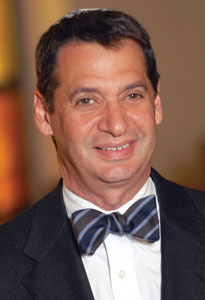 Doug Alpert, the spiritual leader of Congregation Kol Ami, is now officially a rabbi. He received his smicha (ordination) from the Academy for Jewish Religion, on Thursday, May 17, in New York City. He was presented to the Jewish community as a rabbi for the very first time at the ceremony by Rabbi Scott White and Debbie Sosland-Edelman. A large contingent of family and friends also traveled to New York to attend the ceremony. Several former Kansas Citians now living in the New York area were present as well.
Doug Alpert, the spiritual leader of Congregation Kol Ami, is now officially a rabbi. He received his smicha (ordination) from the Academy for Jewish Religion, on Thursday, May 17, in New York City. He was presented to the Jewish community as a rabbi for the very first time at the ceremony by Rabbi Scott White and Debbie Sosland-Edelman. A large contingent of family and friends also traveled to New York to attend the ceremony. Several former Kansas Citians now living in the New York area were present as well.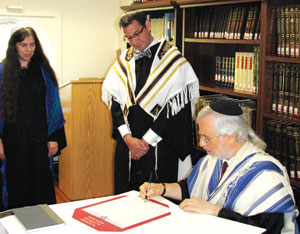 He applied to and was accepted to the Academy for Jewish Religion, a pluralist rabbinical school that teaches the full spectrum of Judaism, in 2006. Rabbi Danny Horwitz, who served Congregation Ohev Sholom in the late ’80s and early ’90s, was also ordained from AJR.
He applied to and was accepted to the Academy for Jewish Religion, a pluralist rabbinical school that teaches the full spectrum of Judaism, in 2006. Rabbi Danny Horwitz, who served Congregation Ohev Sholom in the late ’80s and early ’90s, was also ordained from AJR. The historic Brookside neighborhood has a new addition to its list of shops and restaurants, one with a familiar name but a new look.
The historic Brookside neighborhood has a new addition to its list of shops and restaurants, one with a familiar name but a new look.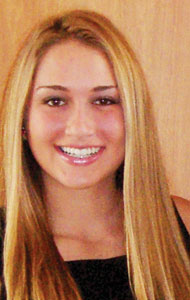 For Meryl Engle, contributing to the Jewish community is a family tradition.
For Meryl Engle, contributing to the Jewish community is a family tradition.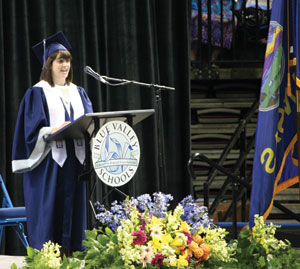 PROUD OF OUR GRADUATES — Every year the Jewish community can boast about the achievements of our college and high school graduates and this year is no exception. One such graduate her parents are happy to brag about is Gabbie Fried, a 2012 graduate of Blue Valley North and the daughter of Sandi and Ed Fried. Gabbie was selected to speak at BVN’s graduation ceremonies, where she reminded her classmates that “rejections only make you stronger, and that’s the key to success.” Gabbie, 18, received the Superintendent’s Award, which is reserved for the top 10 students in the school. In addition she was recognized as an AP scholar with distinction, Kansas Honor Scholar, a Forensics League Academic All American and is a member of the International Thespian Society and National Honor Society. She will attend New York University in New York City in the fall and plans to major in acting with a minor in psychology.
PROUD OF OUR GRADUATES — Every year the Jewish community can boast about the achievements of our college and high school graduates and this year is no exception. One such graduate her parents are happy to brag about is Gabbie Fried, a 2012 graduate of Blue Valley North and the daughter of Sandi and Ed Fried. Gabbie was selected to speak at BVN’s graduation ceremonies, where she reminded her classmates that “rejections only make you stronger, and that’s the key to success.” Gabbie, 18, received the Superintendent’s Award, which is reserved for the top 10 students in the school. In addition she was recognized as an AP scholar with distinction, Kansas Honor Scholar, a Forensics League Academic All American and is a member of the International Thespian Society and National Honor Society. She will attend New York University in New York City in the fall and plans to major in acting with a minor in psychology.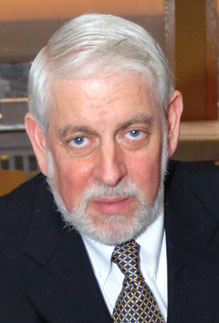 Michael Klein can be described as a visionary, a person who has had unusually keen foresight, especially when it comes to the Jewish community. Over the years that foresight has included helping steward the move of The Temple, Congregation B’nai Jehudah to its current location in Johnson County. He has also been instrumental in seeing the Jewish community’s home for the aged, now known as Village Shalom, also move to Kansas, located just a hop, skip and a jump from the Reform congregation.
Michael Klein can be described as a visionary, a person who has had unusually keen foresight, especially when it comes to the Jewish community. Over the years that foresight has included helping steward the move of The Temple, Congregation B’nai Jehudah to its current location in Johnson County. He has also been instrumental in seeing the Jewish community’s home for the aged, now known as Village Shalom, also move to Kansas, located just a hop, skip and a jump from the Reform congregation.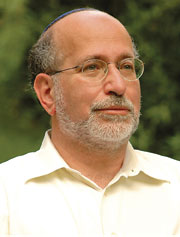 The Kansas City Jewish Community has made a big impression on Rabbi Joseph Telushkin. So much so that the rabbi, whose book “Jewish Literacy: The Most Important Things to Know About the Jewish Religion, Its People and Its History” is the most widely selling book on Judaism in the past two decades, is coming back here to be the keynote speaker at the community’s annual all-night Shavuot celebration on Saturday, May 26, at Kehilath Israel Synagogue.
The Kansas City Jewish Community has made a big impression on Rabbi Joseph Telushkin. So much so that the rabbi, whose book “Jewish Literacy: The Most Important Things to Know About the Jewish Religion, Its People and Its History” is the most widely selling book on Judaism in the past two decades, is coming back here to be the keynote speaker at the community’s annual all-night Shavuot celebration on Saturday, May 26, at Kehilath Israel Synagogue.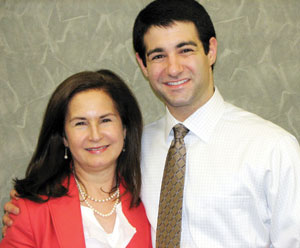 Village Shalom’s upcoming 25th annual Father’s Day Run/Walk event is a family affair. Just ask Jennie Stolper and her son, Jeff.
Village Shalom’s upcoming 25th annual Father’s Day Run/Walk event is a family affair. Just ask Jennie Stolper and her son, Jeff. Avid golfers that have been cooped up inside all winter long — OK maybe not so much this past winter — often pencil in Memorial Day weekend as their time to head back out to the links. This year members of Oakwood Country Club can count on a big celebration of Kansas City’s golf history to go along with lots of great golf.
Avid golfers that have been cooped up inside all winter long — OK maybe not so much this past winter — often pencil in Memorial Day weekend as their time to head back out to the links. This year members of Oakwood Country Club can count on a big celebration of Kansas City’s golf history to go along with lots of great golf.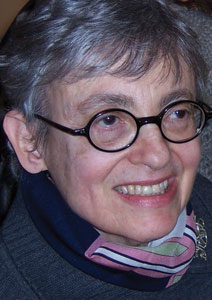 Sailors looking for the next great open body of water would not normally come to Leavenworth, Kan.
Sailors looking for the next great open body of water would not normally come to Leavenworth, Kan.